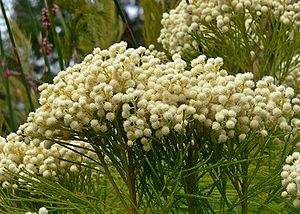Difference between revisions of "Category:Bruniaceae"
Jump to navigation
Jump to search
(move from main namespace) |
|||
| Line 9: | Line 9: | ||
}} | }} | ||
| − | + | {{inedible family}} | |
| − | |||
| − | |||
| − | |||
| − | |||
| − | |||
| − | |||
| − | |||
| − | |||
| − | |||
| − | |||
| − | |||
| − | |||
| − | |||
| − | |||
| − | |||
| − | |||
| − | |||
| − | |||
| − | |||
| − | |||
| − | |||
== References == | == References == | ||
Latest revision as of 15:22, 1 November 2020
| Bruniaceae | |
|---|---|

| |
| Berzelia lanuginosa | |
| Scientific classification | |
| Kingdom: | Plantae |
| Clade: | Angiosperms |
| Clade: | Eudicots |
| Clade: | Asterids |
| Order: | Bruniales |
| Family: | Bruniaceae R.Br. ex DC.[1] |
| Genera | |
|
See text | |
Bruniaceae is a family of plants with no known edible members.
References
- ↑ Angiosperm Phylogeny Group (2009). "An update of the Angiosperm Phylogeny Group classification for the orders and families of flowering plants: APG III" (PDF). Botanical Journal of the Linnean Society. 161 (2): 105–121. doi:10.1111/j.1095-8339.2009.00996.x. Retrieved 2013-07-06.
Acknowledgements
This article uses material from the Wikipedia article Bruniaceae, which is released under the Creative Commons Attribution-Share-Alike License 3.0.
This category currently contains no pages or media.